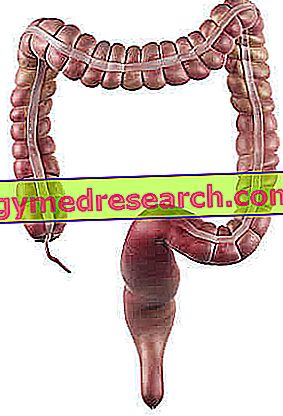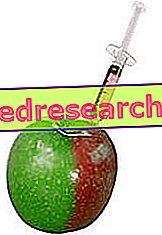Definition
The term "flushes" refers to heat flares, a disorder that troubles and torments the vast majority of women during the pre- and post-menopausal period. In addition to the physical discomfort in itself - which manifests itself with a sudden and unexpected perception of heat, followed by widespread sweating - hot flashes are also a psychological problem, since it is a disorder interposed between the fertile period and that of sterility.
Causes
Hot flashes seem to be the immediate consequence of an altered synthesis of gonadotropins - whose plasma concentration is much higher during menopause - at the expense of estrogens which, on the other hand, decrease significantly. However, scholars have not yet given a precise and unambiguous explanation for the phenomenon.
Menopause: ↓↓ estrogens, ↑↑ gonadotropins
- Risk factors: drug intake (eg calcitonin, nifedipine), thyrotoxicosis, pancreatic cancer, brain lesions / tumors
Symptoms
Every woman who is approaching menopause perceives hot flashes in a completely personal and subjective way, depending (also and above all) on her own state of mind. Generally speaking, hot flashes occur with a sudden rise in basal temperature (increase of 5-7 ° C), followed first by profuse sweating, then by an equally unpleasant perception of chills and cold.
- Secondary symptoms: alongside hot flashes, disorders like anxiety, depression, stress and anxiety are associated.
Information on the Flushing - Drugs for the Treatment of Hot Flushes is not intended to replace the direct relationship between health professional and patient. Always consult your physician and / or specialist before taking the Flush - Heat Flushing Drugs.
drugs
The best approach to fully overcome the discomfort derived from hot flashes, as well as the best natural drug, is certainly tranquility: the stress that accompanies menopausal women, in fact, weighs heavily on the frequency and intensity of symptoms, which can be accentuated or to fade just according to the mood of the woman. Also the partner, in this case, plays a fundamental role: the man should understand the delicate period that the woman is facing, and help her to overcome him with serenity.
However, when hot flashes become a real physical discomfort - as well as psychological - so as to significantly affect a woman's normal daily activities, drugs can alleviate the disorder, thereby improving the quality of life.
It should be remembered, however, that the hormonal alteration of estrogens, during the postmenopausal period, is permanent; according to this, one understands how the role of drugs, in similar circumstances, aims exclusively at alleviating their symptoms.
Hormone replacement therapy seems to be a valid remedy to alleviate menopausal disorders in general, including hot flashes: this therapy involves administering a low-dose estrogen in combination with a progestin.
Antidepressants can be considered as a complementary therapy to the one previously described, only when the hot flashes and the awareness of the fertility decline heavily affect the patient's mood.
Hormone replacement therapy
To ease the trouble of hot flashes, hormone replacement therapy is a valid treatment; the cure consists in the administration of pharmacological preparations consisting of estrogens (low dosage) and progestogens, administered orally, transdermally or transvaginally. The following are the most widely used drugs in therapy:
- Estradiol (Ex. Ephelia, Climara, Estrofem)
- Medroxyprogesterone acetate (eg Farlutal, Provera, Premia)
- Tibolone (Ex. Livial)
- Progesterone (Ex. Prontogest, Prometrium)
For the dosage: read the article on drugs for the treatment of menopausal symptoms. Also read: hormone replacement therapy and cancer risk.
Antidepressant therapy : as we have seen, hot flashes are associated with a marked alteration of the woman's mood, often leading to real depression. In such circumstances, the doctor may prescribe specific antidepressant treatment for the woman. For example:
- Paroxetine (eg Sereupin, Serestill, Eutimil, Daparox): for the treatment of post-menopausal disorders including hot flushes, it is recommended to start treatment with a dose of 12.5 mg drug, to be taken orally, once a day, with or without food. The maintenance dose involves administering 20-25 mg of the drug once a day. Prolong therapy for three months.
- Fluoxetine (eg. Prozac, Azur, Flotina, Fluoxeren): for the treatment of depression in the context of hot flushes, it is recommended to take a dose of drug equal to 20 mg.
- Citalopram (eg. Seropram): another selective serotonin reuptake inhibitor, to be taken at a dose of 20 mg per day, to reduce the effects on mood caused by hot flashes and signs of menopause in general.
- Venlafaxine (eg. Efexor): the drug is a serotonin and noradrenaline reuptake inhibitor. To treat the mood disorder associated with major hot flashes, it is recommended to take the drug at a dose of 37.5 mg per day.
Antihypertensive drugs : some women report significant relief from hot flushes after taking medicines to treat hypertension. However, many studies show no efficacy of these drugs to lighten hot flashes.
Vitamin E : also vitamin E seems to be useful to alleviate hot flashes in some menopausal women. However, even the administration of drugs formulated with vitamin E (Sursum, Rigentex, Evion, Ephynal) is still doubtful and subject to investigation.
However, some women benefit from symptoms by taking 800 IU flushing medication a day.



